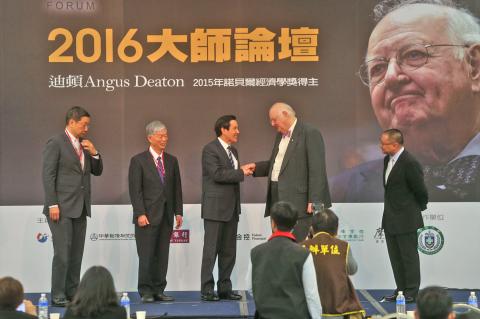Nobel laureate Angus Deaton yesterday lent support to basic income grants as part of government efforts to mitigate wealth and consumption inequality.
“The government should take care of people with low income and should be pushing basic income grants,” the economist told a forum at the Taipei International Convention Center.
Basic income grants, or guaranteed income, are a government-ensured guarantee that no citizen’s income falls below the level necessary to meet their most basic needs.

Photo: CNA
Advocates say the program is an efficient, effective and equitable solution to poverty that not only promotes individual freedom, but also keeps the beneficial aspects of a market economy in place.
Deaton, a professor of economics and international affairs at Princeton University, said that risk, even stationary risk, cumulates into inequality when shaped by rapid technical progress, globalization and a rapidly changing world.
“The larger the factor of shocks, the riskier the world becomes, the more potential there is for increases in inequality,” he said.
Deaton was awarded the Nobel Prize in Economics last year for his analysis of consumption, poverty and welfare, with the Economic Sciences Prize Committee saying that his work linking individual choices and aggregate outcomes had helped transform the study of microeconomics, macroeconomics and development economics.
Deaton last year said that there are still 700 million poor people in the world and they are “a constant reproach to all of us.”
Wealth inequality is likely to increase at a much faster pace unless there is some offset from an insurance arrangement under a range of personal and social mechanism that ties people together, Deaton has said.
Deaton has said that climate change and inequality are the two greatest challenges facing the world, adding: “I do worry about a world in which the rich get to write the rules.”
Deaton has also taken a keen interest in Taiwan, calling it “the home of saving” because people at all ages save a lot, just as all ages save little in the US.
He said he is not able to account for the phenomenon after examining housing, bequest and small business ownership needs.
Deaton rejected the link between Taiwan’s excessive savings and Confucianism, adding that South Koreans are also influenced by Confucius, but save less.

PATENTS: MediaTek Inc said it would not comment on ongoing legal cases, but does not expect the legal action by Huawei to affect its business operations Smartphone integrated chips designer MediaTek Inc (聯發科) on Friday said that a lawsuit filed by Chinese smartphone brand Huawei Technologies Co (華為) over alleged patent infringements would have little impact on its operations. In an announcement posted on the Taiwan Stock Exchange, MediaTek said that it would not comment on an ongoing legal case. However, the company said that Huawei’s legal action would have little impact on its operations. MediaTek’s statement came after China-based PRIP Research said on Thursday that Huawei filed a lawsuit with a Chinese district court claiming that MediaTek infringed on its patents. The infringement mentioned in the lawsuit likely involved

Taipei is today suspending work, classes and its US$2.4 trillion stock market as Typhoon Gaemi approaches Taiwan with strong winds and heavy rain. The nation is not conducting securities, currency or fixed income trading, statements from its stock and currency exchanges said. Authorities had yesterday issued a warning that the storm could affect people on land and canceled some ship crossings and domestic flights. Taiwan Semiconductor Manufacturing Co (TSMC, 台積電) expects its local chipmaking fabs to maintain normal production, the company said in an e-mailed statement. The main chipmaker for Apple Inc and Nvidia Corp said it has activated routine typhoon alert

GROWTH: TSMC increased its projected revenue growth for this year to more than 25 percent, citing stronger-than-expected demand for AI devices and smartphones The Taiwan Institute of Economic Research (TIER, 台灣經濟研究院) yesterday raised its forecast for Taiwan’s GDP growth this year from 3.29 percent to 3.85 percent, as exports and private investment recovered faster than it predicted three months ago. The Taipei-based think tank also expects that Taiwan would see a 8.19 percent increase in exports this year, better than the 7.55 percent it projected in April, as US technology giants spent more money on artificial intelligence (AI) infrastructure and development. “There will be more AI servers going forward, but it remains to be seen if the momentum would extend to personal computers, smartphones and

Catastrophic computer outages caused by a software update from one company have once again exposed the dangers of global technological dependence on a handful of players, experts said on Friday. A flawed update sent out by the little-known security firm CrowdStrike Holdings Inc brought airlines, TV stations and myriad other aspects of daily life to a standstill. The outages affected companies or individuals that use CrowdStrike on the Microsoft Inc’s Windows platform. When they applied the update, the incompatible software crashed computers into a frozen state known as the “blue screen of death.” “Today CrowdStrike has become a household name, but not in